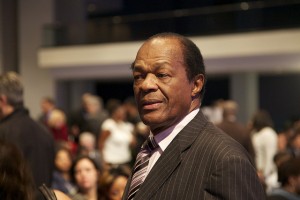Does D.C. Need Gentrification Commmissions?

Tom Bridge / Flickr
Ward 8 Councilman Marion Barry wants to convene a gentrification commission.
When neighborhoods get gentrified, the most vulnerable are often caught off guard. Community activism doesn’t typically gain steam until the prospect of being displaced is eminent.
So Ward 8 Councilman Marion Barry’s idea to convene a gentrification commission is interesting, particularly since Ward 8 isn’t really being gentrified. Sure, some wealthier residents have moved in, but residents are rarely being displaced as a result. There is some development in the pipeline, but it’s uncertain what kind of effect it’ll have on the area
“My problem with gentrification is that those persons come into our community and displace longtime residents,” Barry said during Wednesday’s gentrification panel discussion. “Shaw is a classic example. We saw it coming and we did virtually nothing.”
Ward 8 is ripe for gentrification, Barry said, particularly given the high number of renters. Panel speakers referred to gentrification as a looming, unstoppable force. Yes, there were some mentions of dogs and bikes, and Barry remarking that “we have a lot of gentrifiers who are blogging, who are twittering.” Most of the discussion didn’t focus on race, but rather on protecting residents from being displaced through addressing the root causes of poverty: education, jobs and whether residents have become dependent on government assistance.
Some concrete suggestions did come out of the panel, such as making D.C.’s first source law applicable to all jobs, not just new hires, and supporting longtime businesses. Anwar Saleem of H Street Great Main Street said his neighborhood’s tale is an example of what can happen if such protections aren’t already in place: longtime businesses lost customers during streetcar construction, but at the same time, owners had to pay higher property taxes.
“Why not protect the old time businesses? Why not have a homestead [tax credit] for businesses?” he asked.
ANC Commissioner Olivia Henderson pointed to one of the touchier subjects of gentrification: why is it only when white and wealth move into a neighborhood, that a neighborhood gets better?
“It’s for us, the people, to stand up and fix what we already have… Let’s try to remove some of the blight, some of the crime, some of the drugs,” she said. “Are we going to allow the white people to clean it up, when we had all the opportunity to do it?”
The success of such a commission may very well depend on involving the most vulnerable residents. But they were largely absent during the Wednesday night discussion, resident Robert Cannon noted.
“It’s on us to create a platform for those who are struggling, to bring those most affected by gentrification into this room,” he said.